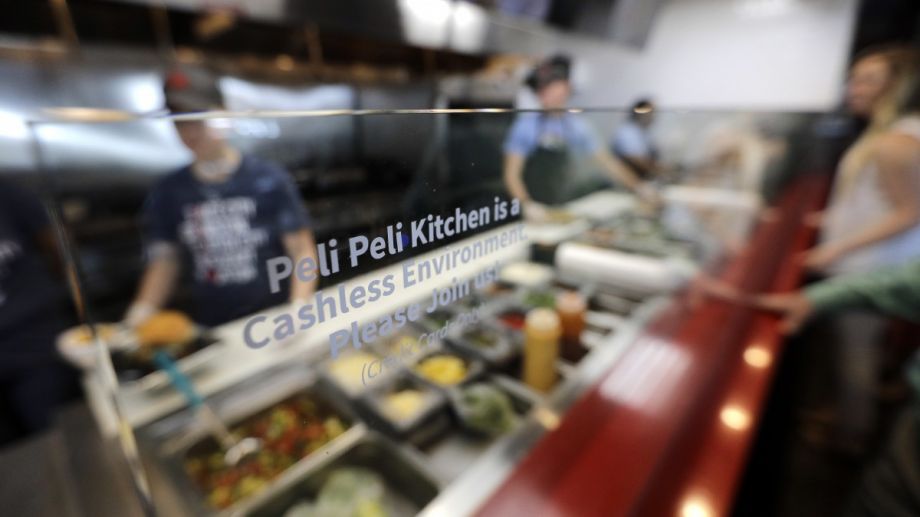A New York City council member is proposing that the city outlaw businesses that don’t accept cash, the Associated Press reports.
Democratic City Councilman Ritchie Torres represents a part of the Bronx where one in four households have no bank account, the NY Daily News said. Citywide, hundreds of thousands of New Yorkers lack a credit or debit card.
The law would force New York retailers to accept cash along with credit cards, or pay up to $500 per violation.
Many New York City businesses are already cashless or in the process of converting. It’s hard to get exact numbers on how many businesses are cashless, but Gothamist pulled together a short list: “Dos Toros, Dig Inn, Sweetgreen, Two Forks, Bluestone Lane coffee, many Danny Meyer establishments, the list goes on,” Claire Lampen wrote.
Other cities have also become alarmed at the practice of restaurants and retailers going cash-free. In Washington, D.C., Councilmember David Grosso introduced the Cashless Retailers Prohibition Act of 2018, calling banning cash “a discriminatory practice that disproportionately affects” the 10 percent of D.C. residents who are unbanked and the additional 25 percent who are “underbanked.” In a press release announcing the legislation, Grosso also said that by banning cash, “businesses are effectively telling lower-income and young patrons that they are not welcome.” (Ironically, WMATA, the agency that runs Metrobus and Metrorail in the city, has been mulling expanding cashless buses while this debate has been ongoing, although the cashless bus question is shelved for now.)
Philadelphia lawmakers have also introduced a ban on cashless businesses, as have lawmakers in Chicago. Only Massachusetts currently bans cashless businesses, thanks to an “obscure” law dating from 1978, but the state retailers association says it’s not enforced.
New Jersey introduced legislation this summer that would have banned cashless establishments. The bill was overwhelmingly approved by the state’s lower house, but the state Senate shelved the bill when Walmart and Amazon, which is testing cashier-less stores, expressed concerns. This week, with HQ2 effectively off the table, the Senate committee voted to advance the bill.
Businesses, on the other hand, say going cash-free is more efficient. One D.C. juice store owner said that going cashless came down to it being simply too difficult keeping track of all the cash at her six locations since her bank wasn’t always in a convenient place.
The lack of cash on hand makes a store a less tempting robbery target, too, businesses say. Still, nationwide, about a quarter of consumers still make all their purchases with cash, Vox reported. Some do so because they don’t have enough money to have a bank account, or can’t afford the risk of overdrafts. Some simply don’t trust banks or have identity theft or privacy concerns.
And what about the fact that cash is still legal tender? Slate reports that that doesn’t really apply here. Cash can be used to settle a debt, but until the restaurant has agreed to sell you a taco, you haven’t actually incurred a debt. Courts have sided with businesses that refuse certain types of cash on a reasonable basis such as when doing so increases efficiency, prevents incompatibility problems with the equipment employed to accept or count the money, or improves security.” That’s why it’s legal for stores to refuse large bills or for soda machines not to take pennies.
Going cashless could hurt the unbanked in more ways than by excluding them from certain stores, Slate says. Brenton Peck, a senior manager at the nonprofit Center for Financial Services Innovation, told the publication: “Encouraging more adoption of card products by pushing the cashless society could compromise people’s financial health. We’re forcing a segment of the population to act in ways they otherwise wouldn’t.” In other words, some people prefer (or would prefer if they had the choice) cash because they don’t have to worry about over-drafting their bank accounts.
In New York, Torres introduced the legislation Wednesday and it has been referred to committee.

Rachel Kaufman is Next City's senior editor, responsible for our daily journalism. She was a longtime Next City freelance writer and editor before coming on staff full-time. She has covered transportation, sustainability, science and tech. Her writing has appeared in Inc., National Geographic News, Scientific American and other outlets.
Follow Rachel .(JavaScript must be enabled to view this email address)
















